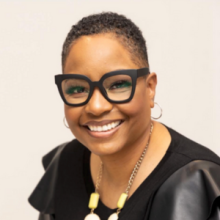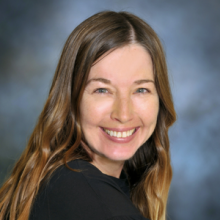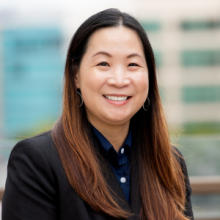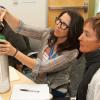
Alumna Colleen McEvoy (right) speaks to a student at Bronco Clinic, a school-based health center she launched at a high school in Inyo County, California (photo credit: ©Lawrence Rickford).
From School-Based Clinics to AI, How Four UCSF Experts are Reimagining Health Care Delivery
As health care in the United States continues to change, UCSF faculty and alumni are making sure that it continues to change for good. That means pioneering new care delivery models —or in some cases, reviving a successful old model — and reimagining research approaches to ensure that scientific discoveries benefit all. Here’s what four such experts are doing.
Integrating AI in the Training of Health Care Leaders
As artificial intelligence (AI) continues to change just about every aspect of our lives, it’s critical that the next generation of leaders understand how to work with the technology. That is especially true in health care, where the AI market grew to $32.34 billion in 2024, and is expected to reach $431.05 billion by 2032, according to Global Market Insights.
Kathryn Wise, OTD, MHSc, OTR/L, associate professor and program director of the Master of Science in Healthcare Administration and Interprofessional Leadership (MS-HAIL) program, is working to prepare those health care leaders through Leadership in Action: Inquiry Innovation, a course completed by MS-HAIL students at the end of their program and includes instruction on AI.

The first part of the course prepares students to finalize and disseminate their evidence-based quality improvement work within their health care organizations. The second part focuses on creating the “AI-informed leader,” Wise says. They learn how to “hone in on understanding the mechanics of AI— not so much the coding but what AI is and the different types of AI, as well as its risks, approaches to implementation, and how it impacts workflows. And most importantly, the human side of leadership”
The focus is on how people use AI and “what leadership in health care could look like if we were to use AI.” Students are taught how to explore and consider aspects of deployment and implementation to meet strategic priorities.
AI might be a great tool, but “what you really need are leaders who can stop and say ‘what’s the problem we’re trying to solve here’,” says Wise.

Improving Black Maternal and Infant Health Outcomes in the South
Black maternal mortality continues to be a devastating problem in the U.S. Black women had a mortality rate of 50.3 deaths per 100,000 live births, which is more than three times the rate for white women, according to data collected by the U.S. Department of Health and Human Services in 2023.
To address these outcomes, Nikia Grayson, DNP, CNM, FACNM, associate professor in the School of Nursing, has been working to re-start a historically important birthing option for Black women: midwifery.
“We had no Black midwives in our community, and after reading about how Black midwives had pretty much been pushed into extinction in the U.S., I felt called to reclaim and restore it,” said Grayson, who is also a midwife.
In 2017, Grayson joined CHOICES: Center for Reproductive Health, an independent, non-profit reproductive and sexual health clinic in Memphis, Tennessee. That same year, CHOICES launched its midwifery services, with midwives attending both home and hospital births. Today, as chief clinical officer, Grayson leads a team of five midwives who deliver approximately 130 babies each year at CHOICES' birth center, the only freestanding midwifery practice in Memphis.
In addition to leading at UCSF as the nurse-midwifery specialty’s co-coordinator, Grayson has also started a fellowship to train more people to do this critical work. “It was important to have a space that was safe, but also a space where they could train and learn from a reproductive justice framework and from a Black feminist framework,” she said. This is important to the patients they serve too, to be a birthing clinic “where the providers come from communities similar to those in which they are now providing care.”

Launching a School-Based Clinic in Rural California
If a student at the Bishop Union High School in Inyo County, California needs help, whether it’s for a mental health concern, a physical exam, or even just access to ibuprofen, they don’t need to go far. They can go to the Bronco Clinic, a school-based health center at their high school, which is open for students during or after school.
“When I moved here, I saw a fair amount of teenagers who were not using birth control or getting access to reproductive health services or other medical services,” said Colleen McEvoy MS ‘06, NP, a School of Nursing alumna and a pediatric nurse practitioner.
She had worked at a school-based health care center before and wanted to recreate the same experience at Bishop Union.
While reproductive health is a big part of what the clinic, which is run through the Northern Inyo Healthcare District, does, it’s also often the first health care stop for the 500 students from Bishop Union and a local alternative high school, students who use the clinic for a range of physical and mental health-related needs.
“We have youth that are bussed into the school from an hour away. Maybe their parents can’t bring them in to a clinic to get a physical,” says McEvoy. “Now, after school the student can walk over and get a physical and a checkup.”
The clinic has become a critical resource for a community where health care can be hard to access. “Rural health is just such a different thing. It’s so important to have access to services and finances for access to services,” she says.
Expanding the first AANHPI Research Registry
When Van Park, PhD, MPH, professor in the School of Nursing, pursued a certificate in ethnogeriatrics, it opened her eyes to a growing problem. She saw how big a concern aging was becoming and “was worried about how the U.S. would respond to the diverse needs of Asian American, Native Hawaiian and Pacific Islander (AANHPI) communities,” she said.
Not only is the AANHPI population underrepresented in studies about aging, but the populations are also significantly underrepresented in research in general. Only 529 of NIH-funded clinical research projects between 1992 and 2018 focused on AANHPI participants, making up only .17% of the total NIH budget, according to a study published in JAMA Open Network. This proportion only increased from 0.12% before 2000 to 0.18% after 2000.

Park is working to change this by expanding the Collaborative Approach for AANHPI Research and Education (CARE) registry, believed to be the first and only research registry in the country that is dedicated to AANHPI populations. The CARE registry, which Park founded in 2020, reached an important milestone in 2023: enrolling 10,000 AANHPI participants.
Park and her research team, including the project’s two other principal investigators, are now working to enroll an additional 10,000 participants. The large size of the participant group is unique, but so is its focus on inclusion and access, since CARE is available in nine languages. The team has now enrolled more than 15,000 participants to the CARE registry.
Not only is the research recruitment registry used to improve participation in research focusing on Alzheimer’s disease and related dementias, but it will also be used to support more AANHPI-related aging and caregiving studies. Building trust with this community is a priority, moving the needle overall on AANHPI participation in research so “it’s not a one-time participation, but becomes recurring,” she says.



